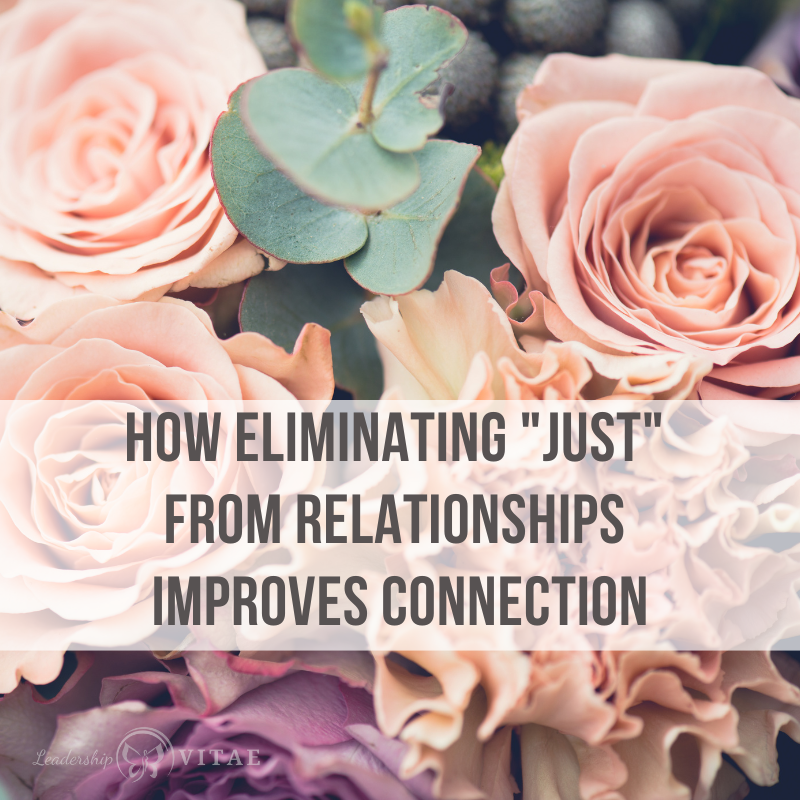
Earlier this year I was on the receiving end of an intervention. Well, maybe not that extreme. Let’s say a stern talking to. Turns out I downplay good things about myself – thoughts and actions – a lot. Someone close to me finally had enough.
Downplaying is the opposite of “making something out of nothing.” It’s taking something we’ve done – thoughtful, kind, loving, etc – and making it out to be nothing.
It wasn’t something I noticed at first. Of course not. Downplaying how I show up has been second nature my entire life. There was always more that could have been done. Better choices or outcomes. Perfectionism and thinking that we’re missing the mark in interpersonal interaction are common tendencies for the neurospicy.
It took a conversation with my BFF to home in on what I was doing and start to notice.
“Why do you do that?”
“Do what?”
“Downplay your heart?”
Ouch.
“Just” in relationships can be anything but
Once she pointed it out, I not only started to notice when I’d do it, but when my caring neurospicy boyfriend did as well. One of us would thank the other for something and “just” spills right out.
It’s just groceries.
It’s just a toy.
It’s just store-bought flowers.
But it’s not “just” anything.
Those groceries I thought to buy showed that I caught a passing remark and knew he would appreciate swiss cheese the next time we made sandwiches. To me it was just groceries. To him it was showing I care.
The Darth Vader he thought I would enjoy wasn’t “just a toy.” It was thoughtful and warmed my heart, tapping into my inner child that forgets to laugh and play.
The store-bought flowers were the first ones he bought me and it didn’t matter where they came from. What mattered is the thought he put into the ones he chose to bring us joy when we have a meal at home.
To the giver in each of these circumstances, it may have seemed like no big deal. It was some cheese or a toy or flowers. To the receiver, who sees the heart in the action and feels love as a result, “just” diminishes it. Dismisses the appreciation and joy they feel for that action because their gratitude can feel brushed aside.

Focus on the care instead of the effort
What I’m coming to realize is that I’m a loving and giving person by default. It hasn’t always seemed that way to me (and probably some around me). There may have been folks in my life that couldn’t/didn’t appreciate how my particular brand of love shows up (whether it’s cheese or bath bombs or funny memes). That didn’t make me any less loving but was difficult to have it reflected.
When there’s a match in a relationship between how we give love and how it is received, it feels effortless. Like “just” no big deal. And yet it is a big deal. Love always is.
Once I heard my boyfriend downplay how he was showing up (and my gratitude), I called us both out in a kind (of direct) way. Shared the observation about what we were doing and why I think “just” needs to get chucked out the window.
What’s the alternative? When we receive gratitude, we can focus on the person and the caring we have for them.
The next time I am tempted to say “it’s just groceries” I’m going to replace with “it makes me feel good having things in the house you like when we plan a meal.”
“Just” for professional relationships
This exercise has me thinking more broadly about how I show up in the world. As a leader, how often do I think my contributions are NBD but mean the world to the person I’m engaging with? Not to overinflate myself (see…downplaying again), but to recognize that there’s real heart behind what I’m doing. That I care and that caring matters.
If I model that showing care and concern as a leader is NBD, what does that say to someone who aspires to leadership? “It was nothing.” “It was just an email reference.”
Instead, I have the opportunity to center the person and deepen the relationship. “You are very welcome. I was so happy to help and appreciate you asking me to be a reference. Please let me know how it goes.”
Heart-centered leadership means leading from our hearts with care and concern for those in our charge. Let’s not downplay that care, making it small with “just.” Instead, let’s recognize that small moments have big impact to those around us.
I needed an intervention to better understand how much I was diminishing my heart. It’s where I lead from at home and professionally. It’s past time to embrace it if I want those around me to know how much I care.
Do you tend to downplay using “just?” I welcome you to join me in kicking it out of our vocabulary.








